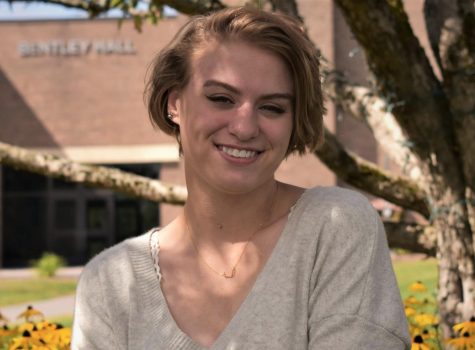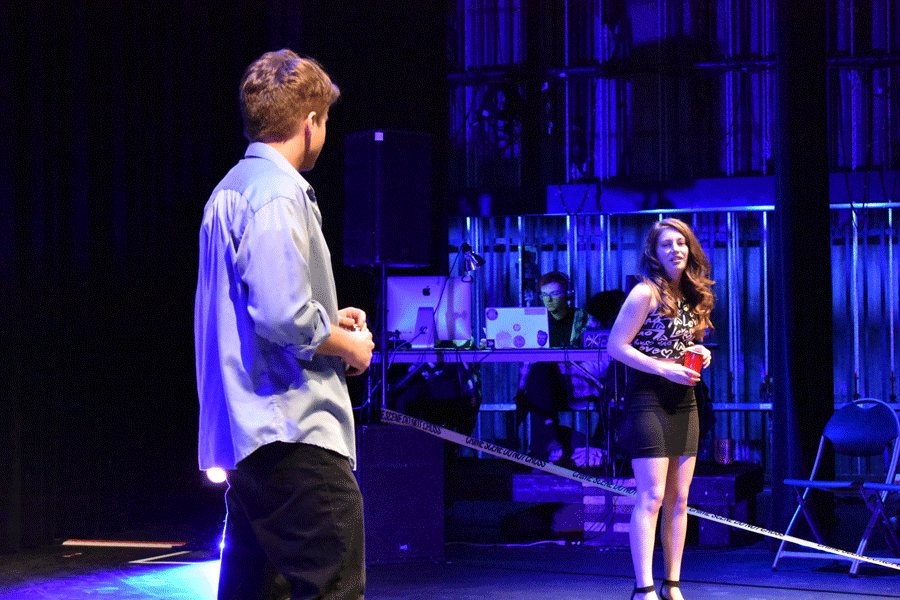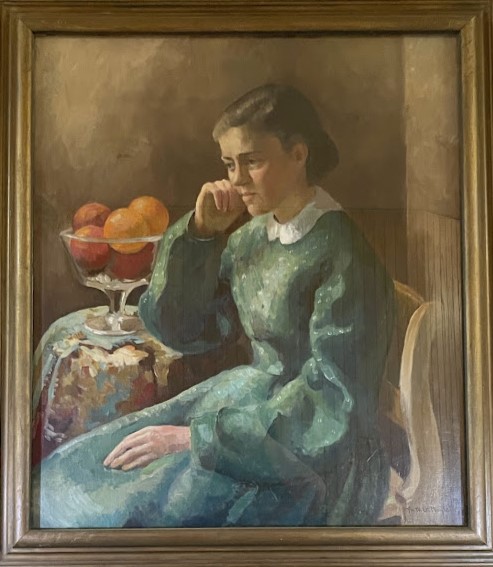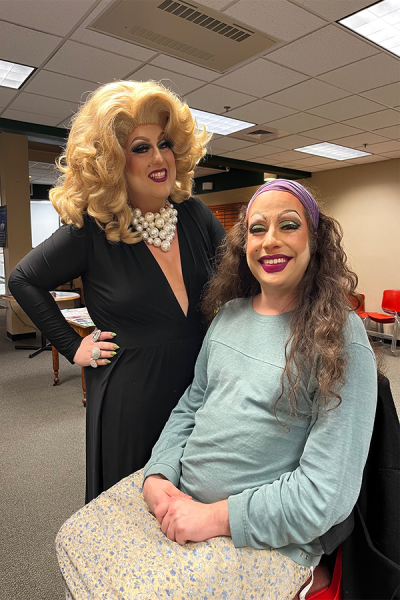A terrific performance with a terrible script
Jacob M. Muther and Maddie Anna in a scene outside of the main house party.
After watching “Good Kids” put on by Dibden last weekend, all I can say is, “Okay, boomer.”
I should preface this and give my congratulations to the cast, who ran well with a poorly written show. Amber Follansbee’s performance as Deidre, the narrator, was excellent. Given that her character was in a wheelchair, she was expressive and conveyed powerful emotion through the show.
Maddie Anna’s character work with Chloe, the main protagonist, was magnificent. Anna, clearly, is a talented actress who is quite comfortable on stage, and her presence shows that.
The football players, played by Kyle Palmer, Kevin Diette, Skylar Bradley and Jacob M. Muther, were by far the most poorly-written of characters, though their actors each did the best with the material given.
The show is meant to be a loose retelling of the 2012 Steubenville rape case, where a young girl passes out drunk and is assaulted by several football players. One of the perpetrators posts videos and photos of the girl online, and the athletes are eventually charged for their crimes.
I don’t mean to sound harsh, though I know I come across that way. But it’s obvious that playwright Naomi Iizuka is very out of touch with the way that high schoolers speak and act in present day.
When Deidre (Follansbee) comes out on stage to vignette a setting for the audience, she sarcastically asks the audience which filter she should use on a photo of the scene. “Toaster?” she cracks. It’s both annoying and indicative of Iizuka’s misunderstanding of teen culture.
“In the olden days” is a phrase used by Deidre to describe the differences between before social media and the present time. It made me cringe. Her character also says “let’s backspace in time,” which made me throw up in my mouth.
The show used excessive use of internet slang and “hashtag abbreviations” linked to social media, which are obtrusive and not at all realistic. High schoolers say “Hashtag TBT” in irony, but they very rarely say it in a serious way.
The names of very few of the characters even matter, because they’re so rarely used. I didn’t remember any of them after the show, even Chloe, who is the main part of all the action.
Chloe (Anna) describes vodka as being “smooth.” I don’t know a single sane person that thinks vodka is a smooth beverage and that it goes down with little resistance. That stuff is nasty.
The dialogue in several parts is too ridiculous to be believable. When Skyler (played by Marissa Mattogno) sees the tweets, she calls 911. “Hello 911,” she says. “I’d like to report a rape.” Then the scene changes.
What person talks like that? Not me, or anyone I know.
Iizuka is known for non-chronological narratives in plays, but the asynchronicity of each scene made the plot hard to follow. Plus, it was unclear until the very end who Follansbee’s character Deidre was meant to be, so the audience kept scratching their heads. Who is this mystery woman in a wheelchair, and why does she matter?
It’s a big “plot twist” that is, frankly, insulting to the audience. It feels cheesy and poorly-planned.
The projection screen above the actor’s heads was the only set piece that wasn’t just a chair or some sort of box, but it malfunctioned halfway through the show. Instead of showing backgrounds, it continually showed the same picture of a neon-lit gas station at night, which further confused me.
Now, because this play deals with the effects of sexual assault, one would hope that the staging of assault scenes would be sensitive to audiences.
Unfortunately, like most of the blocking, it seemed as though the staging had been put together haphazardly. Chloe (Anna) was laid down on her back on a box, and the four football players hovered over her, with one standing over her as if to pantomime the assault. Not only was the whole thing incredibly awkward, but because of where I was sitting, I could see very little of the staging.
The play was set up in black box style on the stage with side lighting, so audience members choosing to sit on the left and right were blinded by full-strength blue and red beams coming from the wings.
I happened to be sitting on the right side of the stage, so when there was meant to be a dramatic wash of color, I could barely see the action as it happened.
Every time a cast member said, “kids these days,” I wanted to grab the playwright by the shoulder and say, “Okay, asshole, we get it. You are so completely out of touch with high school students that it astounds me. Your stunning lack of consultation with actual high schoolers to confirm dialogue is so amateurish.” The whole show runs like that– it’s preachy and condescending and it alienates its target audience.
The show’s narrative ends before litigation, just after the world finds out about what the boys did to that girl while she was incapacitated. After the show at the talk-back, an audience member mentioned that she thought it ended too soon, while another said it carried on unnecessarily long.
The show itself was a little under 90 minutes, and I think it carried on exactly 89.9 minutes too long.
Given the frustrating nature of the content and the lack of visual design elements to draw the show together, I think the cast did a remarkable job. Mattogno, who joined the show only a week before opening, was expressive even through reading from the book.
The mean girls, led by Amber (Anna Sargent) really pulled off the cult-like attitude that 17-year-old girls truly have sometimes, in spite of their truly terrible dialogue.
Next time Dibden attempts to put on a serious play, I hope they pick one that will convey meaning without being so frustrating to watch.
Note from Associate Dean of Students Michele Whitmore:
I want to extend a round of applause to the cast, crew, and director of Good Kids.
What an amazing performance tackling one of the most challenging topics at colleges and universities in our country. Sexual assault, rape, sexual misconduct, or harassment have no place on our campus.
As members of the Johnson community, we all have a responsibility to keep our campus safe from sexual harm; to say something or do something when you see or know something that could be a potential risk to a member of our community.
Our campus has embraced this bystander expectation in conversation and on posters – but we need more than that. We need a community commitment to move this expectation forward from words on posters–to taking action.
If you would like to be involved in creating a Badger Bystander program on our campus, contact me at [email protected] or stop by to see me in the Dean of Students office in Dewey hall.
Thank you again to Director Margo Whitcomb and the fantastic student cast for a performance very well done.

Senior, Journalism & Creative Writing
Grew up in Atkinson, NH
Fall 2018
Along with traditional journalism, I enjoy writing satire and fun feature...

Senior, Journalism & Studio Art
Grew up in Craftsbury, VT
Spring 2018 - Present
I got a black eye and mild concussion in Las Vegas during a rugby...








